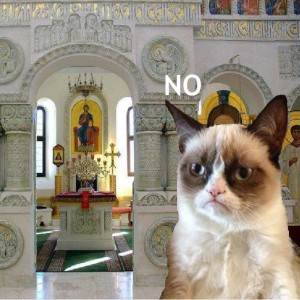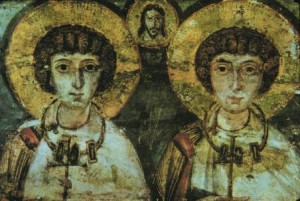For those of you who don’t know (which I’m assuming is most of you) I am a convert. So, while I was beginning my conversion my very Protestant family had only one thing to say, and say it they, did in rapid, almost frenzied succession: “Find a good Bible teaching church!” And while I certainly did find a “good Bible teaching church” (of the One, Holy, Catholic, and Apostolic sort) it was by no means what they really meant.
What they really meant by a “Good Bible teaching church” was, one completely void of something so integral, that it’s almost silly to expect anyone to be without it:
Tradition
The old mantra of the Reformation rears it’s head once again. But there’s one serious flaw in the whole idea of “Sola Scriptura,” namely that
Sola Scriptura significat non Scriptura. In other words “Scripture alone means no Scripture at all.”
That’s right without the passing down of the Scriptures from generation to generation, they would have been long forgotten and left without much thought in a cave somewhere to never be discovered or discussed. We need our parents, our churches, our friends, someone to teach us the Scriptures- contrary to popular belief they don’t just fall out of the sky to each of us individually. And what is tradition if not the passing of customs and teachings from generation to generation. So, I say; without tradition there would be no such thing as Scripture.
I can see the angry mob of non-denominational churchgoers forming already;
but hear me out. I was raised in a very Protestant (Baptist if you must know) household, with a very pronounced acceptance of the primacy of the Scriptures. Yet even still; every time my mother read me the story of Jonah and the whale or Joshua’s siege of Jericho, we were participating in tradition. When I went to Sunday school, tradition. When I went to VBS, tradition. Even going to church on Sunday was a participation in tradition. (The Popery, it’s everywhere!!)
However, the type of tradition most despised by the Protestant is not the little “t” traditions of grace before meals and the Rosary, it’s the big “T” Tradition of the Church and her teaching authority. This tension towards Tradition is almost comical in it’s coming from people claiming the primacy of the Scriptures, since it’s probably one of the most directly Biblical things in the Church’s teaching.
You see, Jesus did not create Sunday school, or VBS, or Bible studies, nor did he write any of the Scriptures, but what he did do is create a Church, not a lose association of individual churches, but a single Church under Peter and his successors
these guys:
and the other Apostles and their successors
these guys:
It is in this one Church that he vests all of his authority, his power to forgive, baptize, marry, bury, heal, teach, etc. It is here that he grants even the Keys to His Kingdom.
So, it’s clear that there is no teaching authority without the Church, thus without Tradition or tradition, yet those of the Reformationist attitude still deny its legitimacy- or do they? Sure they say that they do, but it’s obvious that in the attempt of the Reformation to reinvent the wheel of Christianity, they instead created a cone; sure it rolls, but it can’t go anywhere, and there are few things that mankind dislikes more than stagnation. So, the Protestant allows for his traditions. He goes to church on Sunday, but ignores that its a precept of the Church. He goes on retreat but conveniently forgets that the formula he uses was created by St. Ignatius. He fasts, but disregards the Desert Fathers. He goes to meetings to discuss church politics and teaching, and doesn’t realize that there were Councils on just such a topic more than 1500 years ago. In short, he secretly allows himself to go without Sola Scriptura.
And it isn’t very surprising that he does this, because in truth, we can’t live without tradition. It is our one connection to all of human history. It, in a democratic sense, is the vote of the deceased. Many things that we don’t even notice are all based on tradition; the way we speak, the way we like our coffee -or don’t like our coffee- the foods we like or don’t like, our holidays, feasts, fasts, the way we deal with stress or grief. For better or worse, mankind is stuck with tradition, and the Church is stuck with Tradition, and we can only embrace it, or ignore it.
(for those who may be wondering what my answer is)…
















